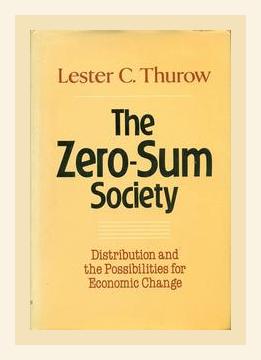Finance, Economics, Trading, InvestingWealth and Inequality
Summary of The Zero-Sum Society: Distribution and the Possibilities for Economic Change by Lester C. Thurow
Introduction
Lester C. Thurow’s The Zero-Sum Society: Distribution and the Possibilities for Economic Change presents a critical analysis of the economic distribution in the United States, arguing that the economic pie is not growing but rather being redistributed among different groups. Thurow’s central thesis is that economic policy decisions are framed within a zero-sum context, where gains by one group are perceived as losses by another. This book, published in 1980, explores how economic change can be managed to benefit all sectors of society rather than leading to increased inequality.
Introduction: Understanding the Zero-Sum Perspective
Thurow begins by defining the zero-sum game in economics: a situation where one party’s gain is exactly balanced by another party’s loss. He argues that this mindset shapes much of the political and economic discourse, particularly in terms of wealth distribution. Thurow asserts that many economic debates are conducted under the assumption that the economy’s total wealth is fixed, and thus, changes in wealth allocation are seen as zero-sum.
Key Concepts and Examples
-
Economic Distribution and Class Conflict
Thurow delves into the historical context of economic distribution in the U.S., exploring how class conflict has influenced policy decisions. He argues that the concentration of wealth in the hands of a few has led to a zero-sum mentality where increasing the wealth of one class necessarily means decreasing the wealth of another. Thurow highlights the social tensions that arise from this perspective, citing the growing disparity between the rich and poor during the late 20th century.
Example: Thurow discusses the impact of inflation and unemployment on different economic classes, illustrating how economic downturns disproportionately affect lower-income groups while wealthier individuals are better insulated from these effects.
-
The Role of Government in Economic Redistribution
Thurow examines the role of government policies in economic redistribution. He critiques both conservative and liberal approaches to economic policy, arguing that both often operate under zero-sum assumptions. Conservative policies, according to Thurow, tend to favor wealth accumulation for the upper class, while liberal policies often focus on redistributing wealth from the rich to the poor, which can be seen as a zero-sum approach.
Example: The book provides an analysis of tax policies and welfare programs, discussing how they aim to address economic disparities but often end up reinforcing the zero-sum perspective by focusing on redistributing existing wealth rather than expanding the overall economic pie.
-
Possibilities for Economic Change
In the latter part of the book, Thurow explores alternative approaches to economic change that could potentially break away from the zero-sum paradigm. He suggests that investments in education, technology, and infrastructure could lead to economic growth that benefits all segments of society. Thurow emphasizes the need for policies that focus on expanding economic opportunities rather than merely redistributing existing wealth.
Example: Thurow advocates for increased investment in education and job training programs as a means to equip individuals with skills that can contribute to economic growth. He argues that such investments can lead to a more dynamic economy where all participants have the potential to benefit from economic progress.
Memorable Quotes
-
“The belief that the economy is a zero-sum game leads to policies that are destructive rather than constructive.” – This quote encapsulates Thurow’s critique of the zero-sum mindset, highlighting how it leads to counterproductive economic policies.
-
“To change the nature of economic discourse, we must first change the way we think about wealth and distribution.” – Here, Thurow emphasizes the importance of shifting perspectives on economic distribution to foster more effective policy solutions.
-
“Investment in human capital is not a zero-sum game but a path to expanding the economic pie for everyone.” – This quote reflects Thurow’s argument that investing in education and skills development can lead to collective economic benefits rather than simply redistributing existing wealth.
Conclusion
The Zero-Sum Society: Distribution and the Possibilities for Economic Change by Lester C. Thurow offers a profound critique of how economic policies are shaped by the zero-sum mentality. Thurow’s analysis of wealth distribution, government policies, and potential avenues for economic growth provides valuable insights into the challenges and opportunities facing modern economies. The book remains relevant as it encourages policymakers and economists to consider approaches that move beyond zero-sum thinking and focus on expanding economic opportunities for all.
Impact and Relevance
Thurow’s work has been influential in discussions about economic policy and distribution. It challenges readers to reconsider traditional economic assumptions and advocate for policies that promote inclusive growth. In the context of current economic debates about income inequality and wealth distribution, Thurow’s arguments continue to resonate, offering a framework for understanding and addressing these issues in a more constructive manner.
